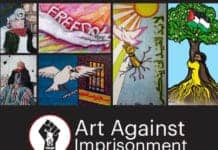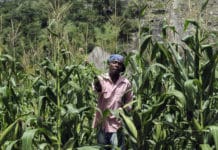
by Zaire Saunders
While all art is either an attempt at expression, or expression itself – cooking cuisine encapsulates the human experience beautifully and expresses it most exactly – a merging of different parts. When you look at life here in the U.S., you’ll find a variety of cultural combinations to indulge in – from Asia, Europe and Africa, Latin America, the Middle East and the Caribbean.
Diversity is a key ingredient to the Bay Area, so a new flavor isn’t far too off from you. ASÚKAR Palestinian Cuban Fusion food is that new flavor you are looking for.
A full time self proclaimed “seeker of truths and justice,” a parent and a loving partner, Nikki proudly claims her born-and-raised status here in San Francisco, while maintaining her Palestinian culture her parents carried with them when they immigrated to the U.S.
She also knows when,where and how to combine ingredients. She’s had years of practice to hone the skills – just go down to ASÚKAR Palestinian Cuban Fusion food to figure that out for yourself.
Nicole Garcia’s story begins at home while under her mother’s care: “Like most immigrants, my mom connected with a Palestinian community and would get together with all the women and they would prepare and cook traditional meals together. My mother was always cooking and feeding someone; that was her love language. I grew up eating traditional Palestinian foods. It was rare for us to eat out when I was young.”
Being of Arab descent, Nikki noted: “Hospitality and food are a huge part of Arab culture. Food is a part of our identity and connection to the land. Foods are grown,ASÚKARharvested, cooked and eaten in season. There are often ceremonies during harvests honoring the land, community and the harvest.”
The love wasn’t always there though. According to Nikki, it was her first child being born that made her pay closer attention to what food she was consuming: “I have always cared about the quality of food that I consumed but even more so after I had a child. As I witnessed her purity, I did not care to put anything bad in her body or on her body. I made sure to only buy and consume organic and clean foods as well as body care items. It became important to me to know what was in our foods beyond reading labels.”

The Cuban side of things reared its head in the face of Nikki’s husband who, says Nikki, “was born and raised in Cuba, so he was accustomed to certain dishes that I did not know how to make. He taught me a lot about Cuban cuisine and how to cook dishes that he wanted to eat. In the beginning, cooking was more like a task rather than enjoyment. The more I cooked the more I began to enjoy it and soon realized it was my creative outlet outside of work.”
“While I do strive to make money, as this is my sole source of income, I remain true to my spirit and refuse to sell my soul in the process. Through my offerings, I promote Palestine and Palestinian culture and identity.
“I speak truths about Israeli settler colonialism and the ongoing land theft and ethnic cleansing of the native Palestinian population. I share knowledge and news about Palestine and Cuba that is often hidden or misconstrued by mainstream media.
“I also share the beauty of both places as well as there is an abundance of beauty amongst the harsh unjust realities. I strive to build community through food and culture and highlight the similarities we share. I create from my heart and with pure intention. Since recently leaving a job of 21+ years, this is a new journey for me; and as unsure and hectic as it can be at times, it fills my soul and brings me joy.”
In a capitalistic white supremacist society – where most of our options available on shelves are owned by the same few corporations – Nikki’s rich culinary history stands out: “Food is political. Food is history. It is culturally transmitted; it is identity. Food is power. Food has never merely been about the simple act of pleasurable consumption. Food is a connection to the land, ancestors and to community,” says Nikki.
“Food was and continues to be a principal tool of colonization. This is evident in traditional Palestinian foods being labeled today as ‘Israeli’ – from hummus, falafel, za’atar to Palestinian sweets like kanafeh. Like my traditional foods, my very existence, my identity is political. And I cannot separate the two.”
Anti-colonization is embodied through the foods being made and eaten when Cuban and Palestinian foods are combined, so to keep herself happy and sane with all the work, Nikki makes sure to add lots of love and care to her art:
“The more I cooked the more I recognized both Palestinian flavors and Cuban flavors complement one another. Again I am creative and food is my art. I began cooking a weekly lunch meal for my coworkers and my food was well received. Because I have no culinary background or training I lacked confidence in my talent.” She kept at it though.
Soon, simmering herself from the heat of practice, Nikki decided it was time to venture out: “This is where the idea of my food business began to grow beyond a thought. I had a notebook that I wrote my business name in, drew out different logos and started to build a menu.
“Three years later my dream came to fruition. I manifested my dream. December 2020 during the pandemic, I decided it was now or never, and I launched my business with a few items: hummus baladi and encurtidos a la Arabé (pickled cauliflower and turnips).
“Shortly after I began a Wednesday meal delivery. All this while still working a full time job. It was and remains important to me to represent not only my culture but that of my husband and our children as well. That is how ASÚKAR Palestinian Cuban Fusion was born. The name, which I made up, is even a fusion of Arabic (sukar) and Spanish (azúcar), which means sugar. Many Spanish words are derived from the Arabic language, yet another similarity.
Starting a business is tough for most, but food service is another beast entirely. Creativity is always in demand, while maintaining a consistent level of quality for all customers is also of the utmost importance: “The food industry is very competitive; therefore, I knew whatever I created had to be original and different to stand out,” says Nikki. “I connected with Oakland Bloom, an open test kitchen incubation program and from there I gained support, knowledge and more confidence in my natural talent to create nutritious and delicious foods.”
“I chose to mix Palestinian and Cuban cultures because that represents the family that I created. Everything comes from my heart and with pure love. I rely on my husband to teach myself and our children Cuban culture. Our two cultures independently are extremely strong, beautiful cultures rich in so much history and pride.
“We are both resilient peoples who stand for truth and justice. However, I want to point out how Cubans are seen as exotic while Palestinians, if even known, are usually seen as terrorists. Palestinian and Cuban cultures and foods are more similar than different.
“It is important to me that our children have knowledge and pride in their culture and identity as Palestinian Afro Cubans. I also wanted to expose the similarities and beauty and how well the two cultures and flavors compliment one another.”
To find Nikki, her artistry and her Pop Up Shop, email palestiniancubanfusion@gmail.com. She also currently has a residency Saturdays 5-9 p.m. at Understory at 528 Eighth St. in Oakland.
Nikki also has Pop Ups at other locations in the Bay Area. You can follow her on IG @palestinian_cuban_fusion for a schedule.
Zaire Saunders is the copy editor and reporter for the SF Bay View Community Journalism Program, which is funded by the California State Library.

 Store
Store












